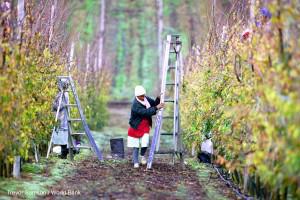Foetal alcohol syndrome not confined to the Capes


Asanda was born with FAS, a condition affecting the children of mothers who drank alcohol during pregnancy. Irreversible, FAS results in growth problems and brain damage, and can also cause heart and kidney defects in children.
As a result of her FAS, Asanda has learning difficulties that have held her back in school. She also bears many of the distinctive facial features shared by children with FAS such as wide-set eyes, thin upper lips and flattish faces.
FAS is one of the few inheritances Asanda’s mother left her before she passed away, leaving her in the care of her aunt, Thandiwe Mathabela.
“Her late mom used to drink very heavily during her pregnancy,” said Mathabela, who adds that her niece has trouble concentrating on tasks and is slow to learn new things. “Asanda is just different from other kids.”
Numerous studies in South Africa have found that as many as 10 percent of children surveyed in communities in the Northern Cape as well as in isolated Western Cape towns may be living with FAS.
While media attention around FAS has focused on high prevalence rates in the capes, the Nutrition Information Centre of the University of Stellenbosch cites previous research showing prevalence rates of almost four percent among children surveyed in areas of Johannesburg such as Soweto, Lenasia and Westbury.
After discovering that her adopted daughter Tisha was born with FAS, Vivien Lourens started the FAS Information Centre. Lourens said she believes that mothers need more education to prevent FAS.
“Education and awareness programmes in schools and in communities must be available,” she told OurHealth. “The health workers and social workers should be well informed so that they can tell mothers-to-be of the dangers.”
*Name withheld to protect child’s identity
Author
Republish this article
This work is licensed under a Creative Commons Attribution-NoDerivatives 4.0 International License.
Unless otherwise noted, you can republish our articles for free under a Creative Commons license. Here’s what you need to know:
You have to credit Health-e News. In the byline, we prefer “Author Name, Publication.” At the top of the text of your story, include a line that reads: “This story was originally published by Health-e News.” You must link the word “Health-e News” to the original URL of the story.
You must include all of the links from our story, including our newsletter sign up link.
If you use canonical metadata, please use the Health-e News URL. For more information about canonical metadata, click here.
You can’t edit our material, except to reflect relative changes in time, location and editorial style. (For example, “yesterday” can be changed to “last week”)
You have no rights to sell, license, syndicate, or otherwise represent yourself as the authorized owner of our material to any third parties. This means that you cannot actively publish or submit our work for syndication to third party platforms or apps like Apple News or Google News. Health-e News understands that publishers cannot fully control when certain third parties automatically summarise or crawl content from publishers’ own sites.
You can’t republish our material wholesale, or automatically; you need to select stories to be republished individually.
If you share republished stories on social media, we’d appreciate being tagged in your posts. You can find us on Twitter @HealthENews, Instagram @healthenews, and Facebook Health-e News Service.
You can grab HTML code for our stories easily. Click on the Creative Commons logo on our stories. You’ll find it with the other share buttons.
If you have any other questions, contact info@health-e.org.za.
Foetal alcohol syndrome not confined to the Capes
by jamesthabo, Health-e News
February 11, 2015
MOST READ
FS woman waits 4 years for medical negligence pay out after ‘out of court settlement’
Prolonged power outage leaves hospitals in the dark for two days
There’s more to self-care than scented candles or massages, it’s a key public health tool
Access to clean water and stable electricity could go a long way to addressing rising food poisoning in SA
EDITOR'S PICKS
Related

New long-acting injectable drug might soon be a key HIV treatment


